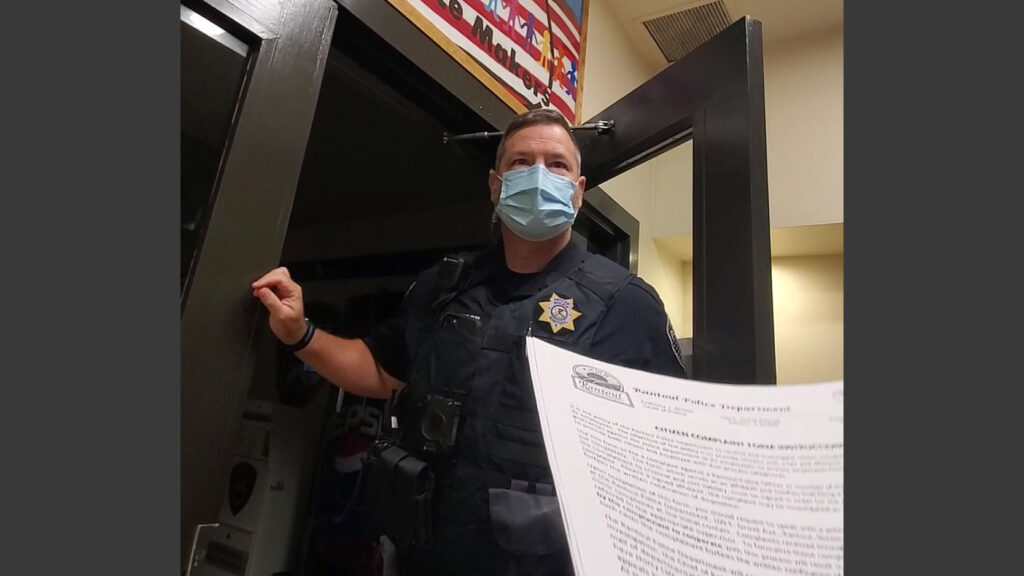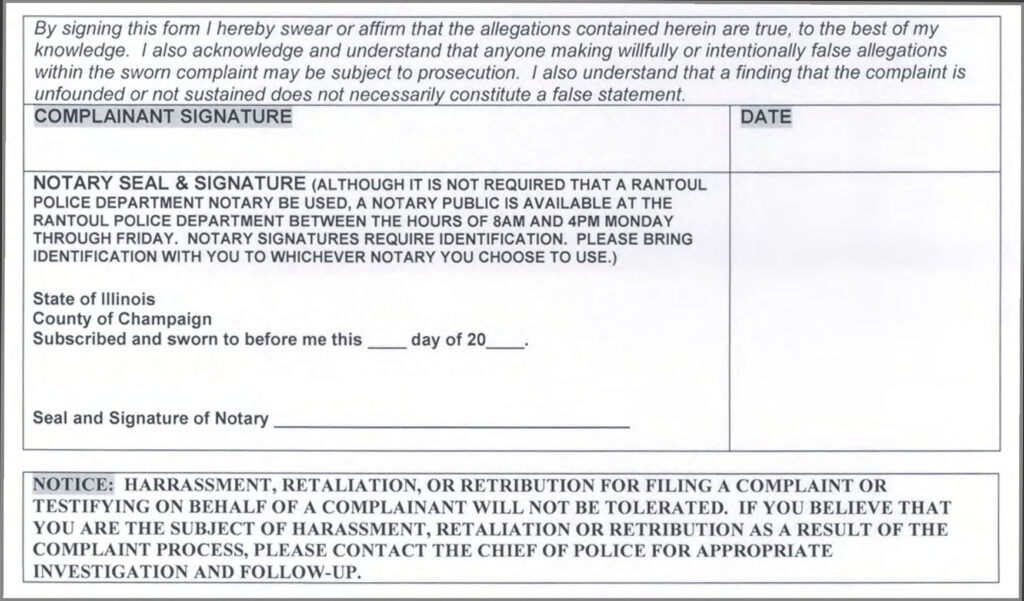
Check CU has been made aware of Rantoul Police Officers handing out police complaint forms which appear to violate Illinois State Law.
On November 7th, 2021, Rantoul Police Officer Marcus Beach gave a civilian a Rantoul Police complaint form which requires the complainant to sign a sworn affidavit and have the affidavit subscribed and sworn by a licensed notary.
The Uniform Peace Officers’ Disciplinary Act explicitly states that police complaint forms cannot have any type of “sworn affidavit” requirement:
(50 ILCS 725/3.8) (b) It shall not be a requirement for a person filing a complaint against a sworn peace officer to have the complaint supported by a sworn affidavit or any other legal documentation.
Even attaining a copy of the unlawful form was not easy – Officer Rikki McComas first directed the complainant to call METCAD 9-1-1 using the telephone in the Rantoul Police Department Lobby. METCAD 9-1-1 is not designed or intended to accept civilian complaints about police officers.
Around 6pm on a Sunday, it took the complainant about thirty minutes to get a paper complaint form from the Police Department. Rantoul PD does not place complaint forms in any visible or accessible place in their lobby, and the forms don’t appear to be available anyplace on the Rantoul PD webpage, including their “Document Center”.
To acquire a copy of a complaint form, you must ask a police supervisor. The Village of Rantoul website suggests that even if you inquire about making a complaint, the on-duty supervisor would not immediately supply a complaint form, but would first try to settle your complaint verbally:
“You may contact the police department 24 hours a day by telephone and ask to speak with an on-duty supervisor who will try to immediately address your complaint. If you are wanting to come to the Rantoul Police Department and make a complaint, the lobby is open from 7am to 5pm Monday through Friday excluding holidays.
If the supervisor is unable to satisfy your complaint, the supervisor upon your request, will provide you with a written complaint form, and detailed written instructions on how to pursue a formal written complaint. Once completed and returned to the Police Department, you will be contacted by a member of police management, and the formal complaint process will begin.”
A copy of the forms provided by Officer Beach is provided here (click for full 5-page PDF):

Officer Beach also refused to stop recording the complainant with his body camera even after several requests for him to stop. The Illinois Law Enforcement Officer-Worn Body Camera Act indicates that an officer must turn off their body camera upon request unless they suspect that the subject has committed a crime or is about to commit a crime, and the officer “must indicate on the recording the reason for continuing to record despite the request”. Beach said he would never turn his camera off upon request, unless he was inside of someone’s private residence.

Shall we dispenser with just one of the lies in this article by referencing the actual State Statute?
https://www.ilga.gov/legislation/ilcs/ilcs4.asp?ActID=3662&ChapterID=11&SeqStart=100000&SeqEnd=1000000
“(3) Cameras must be turned on at all times when the
officer is in uniform and is responding to calls for service or engaged in any law enforcement-related encounter or activity that occurs while the officer is on duty.
(A) If exigent circumstances exist which prevent
the camera from being turned on, the camera must be turned on as soon as practicable.
(B) Officer-worn body cameras may be turned off
when the officer is inside of a patrol car which is equipped with a functioning in-car camera; however, the officer must turn on the camera upon exiting the patrol vehicle for law enforcement-related encounters.
(C) Officer-worn body cameras may be turned off
when the officer is inside a correctional facility or courthouse which is equipped with a functioning camera system.
(4) Cameras must be turned off when:
(A) the victim of a crime requests that the
camera be turned off, and unless impractical or impossible, that request is made on the recording;
(B) a witness of a crime or a community member
who wishes to report a crime requests that the camera be turned off, and unless impractical or impossible that request is made on the recording;
(C) the officer is interacting with a
confidential informant used by the law enforcement agency; or
(D) an officer of the Department of Revenue
enters a Department of Revenue facility or conducts an interview during which return information will be discussed or visible.
However, an officer may continue to record or resume
recording a victim or a witness, if exigent circumstances exist, or if the officer has reasonable articulable suspicion that a victim or witness, or confidential informant has committed or is in the process of committing a crime. Under these circumstances, and unless impractical or impossible, the officer must indicate on the recording the reason for continuing to record despite the request of the victim or witness.
(4.5) Cameras may be turned off when the officer is
engaged in community caretaking functions. However, the camera must be turned on when the officer has reason to believe that the person on whose behalf the officer is performing a community caretaking function has committed or is in the process of committing a crime. If exigent circumstances exist which prevent the camera from being turned on, the camera must be turned on as soon as practicable.
(5) The officer must provide notice of recording to
any person if the person has a reasonable expectation of privacy and proof of notice must be evident in the recording. If exigent circumstances exist which prevent the officer from providing notice, notice must be provided as soon as practicable.”